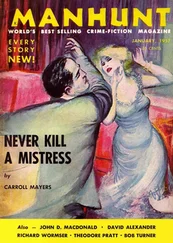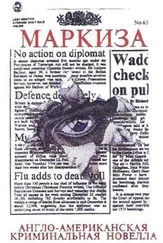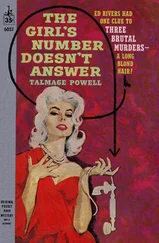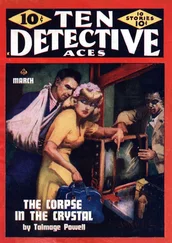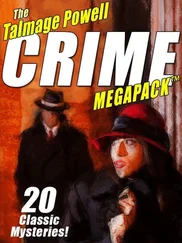The trio about the stove continued their various occupations: one dozing, one chewing homemade twist, one just as studiously whittling thin shavings into the shallow sandbox in which the stove was set.
The tobacco chewer fried spittle against the cherry-red side of the stove and said, “Doc, I hear Edie Clane has had her baby.”
A silence took possession of the store. The whittler paused; the tobacco chewer stilled his lank, lean, stubbled jaw; the dozing man cracked his eyelids.
“Where did you get that?” I asked.
“Rufe — the sheriff — told me. Said he was up there at the Clane place this morning, figuring the weather must have drove Jack in out of the hills. Said Edie is poorly from having the child with only a midwife.”
I felt the muscles on the back of my neck tighten. They were looking at me, waiting for me to affirm the report. But I didn’t affirm or deny. I said, “Edie can take whatever comes her way.” Then I turned up my coat collar against the wind and left the store.
Rufe was getting ready to leave his office when I got there, a swirl of snow entering with me. He grinned at me and finished stuffing the ends of his muffler under his leather jacket. He was a tall, handsome young man. There was rawboned, sinewy strength in the sweep of his shoulders and quick intelligence in his brown eyes. Rufe was born an inch above the average cut of man. He was hard-working, honest, a leader among his people. There was only this one bad flaw in him, this blind, unreasonable hatred he bore for Jack Clane. I, and all those close to him, knew that it was like a festering sore, eating away at the good fibers that made him a man.
“Doc,” he said, “this weather has brought the blood ready to bust out of your cheeks.”
“Not only the weather,” I retorted.
He raised his brows and went about pulling his hat down snug on his head.
“You know what I’m talking about!” I said. “It’s a low-handed trick you’re trying, putting out that rumor that Edie is sick from having her baby all alone. You know that word will get to Jack when he stops at some cabin for food or passes a hunter in the hills. You figure a new born babe and an ailing wife is bait strong enough to get Jack in the trap you’ll be ready to spring on him.”
“I’m the law,” Rufe said, “and he’s a would-be murderer on the run. If I can’t find him by going out in the hills, I’ll make him come to me. Doc, whose side are you on anyway?”
We stood a moment eye to eye, glaring. Then I sighed. “You young fool, whose side have I always been on? This poison you’re nursing inside yourself is about as safe as sleeping with a rattlesnake. In your heart you know that Jack Clane is no would-be murderer. And a trick like this — it’s beneath you. It’s not like you.”
He had pulled on his gloves. He was ready to leave. He locked the office when we were outside. I watched him walk to the mud-caked car with the sheriff’s emblem on the door. He walked straight, not bending against the fury of the storm, his booted feet hitting the frozen earth solidly, a gun hanging at his side, a star pinned on his chest. I shook my head and moved off toward my own car.
Jack Clane’s place was halfway up the reaches of Huckleberry Mountain. It consisted of a few acres of meadow land and rocky hillside farming patches. The barn and corn crib sat off beyond the house, which was a low structure of hand-hewn logs the color of brown earth, set tight and snug against the breast of the earth itself. This was the kind of place that required the hard fertilizer of a full measure of a man’s sweat, a place that yielded only when forced to by determined, work-calloused hands, if the human beings on the place were to survive.
By the time I stopped my car in the narrow, rutted dirt road below Jack’s house, the snow was abating, but the wind was higher. Whole stretches of barren, frozen mountainside were completely naked of snow. The wind had whipped it away to pile it in powder fine drifts in the low places as the snow had fallen.
I stumbled and slipped a time or two as I went up the path toward the small yellow spots of light that marked the windows of the Clane house. Puffing, my nose feeling like an ice box ready to start dripping, I knocked on the cabin door. It was opened by Belle Felder, the fat, sleepy-looking fourteen year-old daughter of a family across the ridge.
I moved inside quickly and Belle closed the door. Edie was sitting in a rocking chair near the yawning stone fireplace where an oak fire crackled. My knock had brought her to the edge of her chair, and she didn’t relax even after she saw who it was.
I put my bag on the center table, peeled off my gloves, and stretched my hands out to the fire. I smiled at her.
“You’ve got some word of Jack,” she said.
“Nonsense. I simply thought to stop by and check on my prettiest patient before turning in for the night. How do you feel, Edie?”
She ignored the question. She was a small woman of delicate bones. Her face was thin, made alive by a dream-like kind of sensitive beauty. As sometimes happens with slender women, she was great with child, massive with child. It seemed as if this offering to her race stirring within her would never stop growing.
I had worried about her more than I cared to admit. The delivery would take place right here in the cabin. That was tradition, convention; that was where all hill babies were born. But a factor far stronger than convention bound her to the cabin — her dread, surpassing even her terror of first-birth, that Jack would risk himself to return to her side and find her gone when her time came.
She looked into the fire; then turned her head to me and her large, dark eyes seemed to have gathered to themselves some of the heat of the flames. “I know what Rufe is trying to do. The Felders heard as early as this morning. That’s why they sent Belle over.”
“Are you sure Rufe started the rumor?”
“Who else would? Rufe couldn’t catch Jack; so he’s using this way.”
“There isn’t much I can say on Rufe’s behalf, is there? Would you believe me?”
“No, it wouldn’t be like you to defend him for a hateful thing,” she said. “Once I thought I loved Rufe. Now I can’t help pitying him. He’s living with his own private devil.”
After I examined her, I gave her a light sedative. She’d be hysterical before long if she continued to think back over this day, the arrival of Belle, big-eyed to see the baby, her questioning of Belle until she understood the tale that had been started.
When I went out in the night again, I paused below the cabin. My gaze moved over the windswept reaches of the wild mountains. I didn’t know exactly what I expected to see, perhaps Rufe’s shadow in the pale, cold moonlight that had come with clearing skies.
Alone in my house that night, I lay in my feather ticking and tried to sleep. The rushing wind, moaning in the eaves, annoyed me. Slumber danced away from me in the flames in the fireplace. My mind was on edge, remembering.
It was written in bone, muscles, blood, and brain that Jack and Rufe be either friends the powers of darkness couldn’t sever or the bitterest enemies. There was no middle ground, no meeting place for those two. The presence of one was a challenge to the other.
It had begun years ago, when both attended the one-room country schoolhouse below Walnut Gap. Jack’s ma had died and his pa had sent him from north Georgia, one segment of a broken family, to live with an aunt and her husband.
Rufe waited for Jack by the schoolhouse pump that first day. Rufe spat on his knuckles and said, “You have to fight me if you go to this school.” Rufe’s words carried no bravado. He wasn’t a bully, simply a young, primitive king already sensing a challenge to his domain. The boys fought that day, as if they were men, toe to toe, silently. Neither quit; both stopped fighting from exhaustion that left them on the earth sucking for air. But Rufe knew in his heart that the other boy had the edge on him.
Читать дальше

